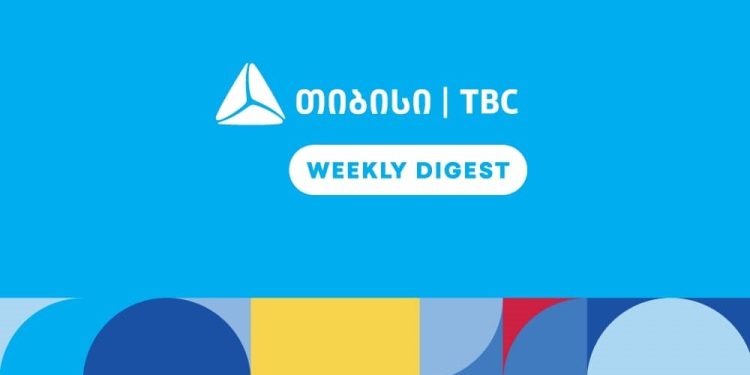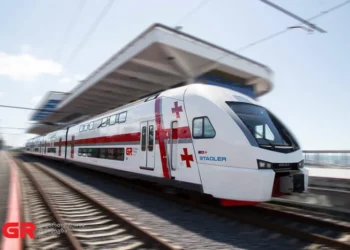TBC Concept Presents the 28th Annual Tbilisi Jazz Festival

With the support of TBC Concept and organized by Eastern Promotions, the 28th Tbilisi Jazz Festival will take place from May 1 to 3 at the Kote Marjanishvili Theater. As always, this year’s festival will feature world-renowned jazz stars, promising three unforgettable nights of exceptional music.
Festival Lineup:
- May 1 | Lakecia Benjamin
- May 2 | Till Brönner & Band
- May 3 | Steve Coleman & The Five Elements
Lakecia Benjamin is a celebrated American saxophonist and composer known for her powerful sound and genre-blending style. Her dynamic performances fuse jazz, funk, and soul into an energetic and bold musical experience. A five-time Grammy nominee, including a 2025 nod, she has shared the stage with legends such as Stevie Wonder, Aretha Franklin, and Alicia Keys.
Till Brönner, a renowned German trumpeter, composer, and producer, is recognized for his emotionally rich and innovative sound. His music blends jazz, pop, and bossa nova into a unique and modern expression. Brönner has collaborated with artists like Diana Krall, Herbie Hancock, and Dave Brubeck, and is a recipient of multiple Echo Jazz Awards. Outside of music, he is also an accomplished photographer with several exhibitions to his name.
Steve Coleman, an influential American saxophonist and composer, is known for pioneering new directions in jazz. In the 1980s, he and his peers developed the M-Base concept—a musical and philosophical framework that combines intricate rhythms, improvisation, African influences, and abstract ideas. Coleman’s visionary approach has deeply influenced generations of jazz musicians. He is a Grammy Award winner and a trailblazer of “music for the mind.”
Exclusive Offers for TBC Concept Cardholders:
- Until April 9: Enjoy a 25% discount on tickets with your TBC Concept Visa card during the pre-sale period.
- From April 10 onward: Get a 20% discount with TBC Concept Visa cards, and a 10% discount with TBC Visa cards.
Celebrate world-class jazz with TBC Concept at the heart of Tbilisi this May.
Empowering Business Growth Through Partnership: GEC Consulting and TBC Business

In today’s fast-evolving business landscape, companies are required to make swift and effective decisions. In response to these challenges, GEC Consulting was established in 2010—an international entrepreneurial and management consulting firm designed to support strategic development, business process standardization, and digital transformation through a collaborative approach.
Supported by TBC Business, GEC Consulting has positioned itself as a key partner for organizations navigating rapid growth, seeking operational efficiency, or aiming to structure and scale their internal processes for stronger market positioning.
To date, GEC Consulting has successfully implemented around 200 projects, including strategic planning, business analytics, and process optimization for its partners.
“Our projects are always tailored to the needs of each client. Through an individual and co-creation approach, we work closely with company leadership to develop strategies, identify opportunities, and outline actionable growth plans,” says Giorgi Simongulashvili, founder of GEC Consulting.
Innovation and self-development are just as important to GEC Consulting as supporting its clients. One significant milestone in the company’s journey was securing its own office space—a move made possible with financial support from TBC. This investment not only provided the right environment for growth but also marked a pivotal point in the firm’s development.
The collaboration between GEC Consulting and TBC Business continues to grow. Giorgi Simongulashvili has served for several years as a member of the TBC Business Awards jury, and as a coach-mentor specializing in business models and strategic planning. As Giorgi notes, the relationship is mutually beneficial and is set to deepen even further in the coming years.
TBC Distribution and Diogenes: A Special Treat for Book Lovers

TBC’s unique product, Distribution, was designed to make it easier for customers with diverse interests and needs to fulfill their desires. That’s why TBC constantly introduces attractive and tailored offers.
This April brings a special delight for book lovers. Thanks to a 1+1 promotion currently running at the physical stores of Diogenes—one of Georgia’s leading publishing houses—customers who purchase books using TBC Distribution will also receive an additional 10% discount.
In celebration of the upcoming International Book Festival, TBC Distribution is preparing more exclusive offers for readers. Soon, you’ll once again have the chance to purchase your favorite books and pay for them in four equal installments over four months—with 0% effective interest and no hidden price increases.
What’s more, Distribution transactions will be available at all participating festival locations. This means you can make your purchases on the spot and receive a full refund, which can then be distributed across your chosen repayment period.
Double Date, Double Benefits: Special Offers from TBC Distribution Every Month

Starting April 4, 2025, TBC Distribution introduces a new tradition — exclusive offers on the second day of every month.
The first opportunity arrives on 04.04. On this day, customers shopping at ICR and Okaidi online stores will receive a 30% cashback (up to 100 GEL) when paying with TBC Distribution, valid through April 30.
But that’s not all — purchases can be split into 4-month installments with 0% effective interest and no price markup. You pay exactly what the product costs, nothing more.
TBC Distribution is a unique solution designed to help customers fulfill their wishes — whatever their needs or interests — easily and affordably.
So, mark your calendar and get ready to turn every double date into an opportunity with TBC Distribution.
- TBC Campus: Bridging Business and Technology for Georgia’s Future
- Photo: Campus
TBC Campus is not your typical university—it’s an innovative educational space where students gain both theoretical knowledge and practical experience in business and technology. Upon completing the campus’s online programs, participants are equipped to enter the competitive job market in their chosen fields.
Access to quality education is a key priority for TBC. In line with its broader educational mission, TBC Campus offers young people aged 18 to 24 the opportunity to master the most in-demand areas of business and technology—completely free of charge and accessible online from anywhere in Georgia.
Through a combination of engaging online courses and hands-on learning guided by experienced professionals, TBC Campus prepares students to meet the demands of the modern job market. Graduates leave the program ready to pursue careers in high-demand fields, equipped with relevant skills and confidence.
“I took a digital marketing course. It was a really good experience for me because I learned a lot of new things that I didn’t think were related to marketing at all. I also broke many stereotypes. I think that knowledge of digital marketing is a very important skill for future employment, because this direction is already used by all companies today.”
— Keso Mechurchlishvili, graduate of TBC Campus
TBC continuously listens to the voices of the new generation. Based on feedback from the first wave of students, this year’s TBC Campus will introduce brand-new courses alongside the existing ones. Keep an eye on the official website for updates and registration dates.
The most important thing is to believe in your goals—and with TBC’s education programs, you can learn wherever you are, explore your interests, and deepen your knowledge in a dynamic, innovation-driven environment.
TBC Capital and Global Rating Agencies Discuss the Future of Capital Markets

TBC Capital, in collaboration with international rating agencies Fitch Ratings and Scope Ratings, hosted a comprehensive event focused on capital markets.
The meeting brought together representatives from key institutions, including the agency Enterprise Georgia (“Produce in Georgia”) and major international financial organizations such as the EBRD, IFC, and ADB.
Through keynote speeches and panel discussions, the event explored crucial topics including: the macroeconomic outlook of global and local markets, the current landscape and future trends of the Georgian capital market, key criteria for company credit ratings, and essential considerations for issuers in 2025.
“Year after year, we see growth in the number of issuers, market volume, and investor interest in the capital market. At this event, we welcomed several of our long-term partner companies, many of whom already have experience in issuing securities. We’re proud to offer more businesses alternative financing opportunities beyond traditional banking services. In today’s fast-changing environment and amid global uncertainties, TBC’s role in sharing market insights, trends, and expert analysis becomes even more vital. Together with leading international rating agencies, we discussed market developments, issuer readiness, and expert expectations,” said Otar Sharikadze, Director of TBC Capital.
TBC Capital Releases Comprehensive Review of Georgia’s Residential and Commercial Real Estate Market

TBC Capital has published its latest research on Georgia’s real estate sector, accompanied by a webinar titled Georgian Residential and Commercial Real Estate Market Review – 2024 Results and 2025 Expectations. The report provides insights into key trends, performance indicators, and future prospects across the residential and commercial segments.
Commercial Real Estate: Positive Momentum Continues
In recent years, increased economic activity and the expansion of the retail sector have positively influenced Georgia’s commercial real estate market—including shopping malls, high-street retail, and business centers. Rising wages have boosted consumer purchasing power, resulting in greater spending on retail products, while ongoing urbanization is driving demand for both retail and consumer services.
Shopping Malls
Commercial real estate activity remains heavily concentrated in Tbilisi, which currently hosts 10 modern, multifunctional shopping centers with a total leasable area of 291,728 sq m. Batumi follows with 5 centers totaling 53,901 sq m. Shopping centers in Kutaisi, Zugdidi, and Telavi are typically hybrids, blending modern formats with traditional open markets. Notably, Zugdidi welcomed a new shopping center in 2023, offering international and local brand stores.
In 2024, the average rent in Tbilisi shopping centers reached $24.1 per sq m—up 7.4% year-on-year. Batumi followed closely at $23.1 per sq m, marking a 5% annual increase. These trends are attributed to the launch of new centers and continued economic growth, particularly in the Adjara region.
The pipeline for new retail space remains strong. Tbilisi will soon see the opening of Tbilisi Outlet Village (May 2025) and Children’s World shopping center, which received its construction permit in 2024. Batumi will add Orbi City and World Trade Center, while Telavi plans to open a new center in fall 2025.
Street Retail
In 2024, Tbilisi posted the highest average rents for central street retail at $31 per sq m, followed by Batumi at $25.5 per sq m. Within Tbilisi, Rustaveli Avenue ($33.3 per sq m) and Chavchavadze Avenue ($33.2 per sq m) command the highest rents. In Batumi, Gorgiladze Street leads with an average rent of $29.4 per sq m.
Looking ahead, 29 new retail unit construction permits were issued in Tbilisi in 2024, indicating potential growth in supply over the next 3–4 years.
Business Centers and Office Market
In 2024, average rent in Tbilisi business centers rose by 6% year-on-year to $23.4 per sq m. Rent levels vary by classification: Class A business centers averaged $28 per sq m, Class B centers $15.1, and Class C office spaces—typically ground-floor units in residential buildings—averaged $13 per sq m.
Tbilisi’s business centers also saw improved occupancy, with the average vacancy rate dropping by 2 percentage points to 12%. Class A properties performed best, achieving a 10% vacancy rate.
A total of 18 new construction permits for business centers were issued in 2024, signaling robust development activity, particularly in Vake and Saburtalo.
In Batumi, average office rents stood at $16.2 per sq m—comparable to Tbilisi. However, cities like Batumi, Kutaisi, Zugdidi, and Telavi face a shortage of formal office space, with most offices still located in residential buildings. Future developments in these cities are expected to integrate office space into multifunctional complexes and shopping centers.
Residential Real Estate: Market Growth Stabilizing
Georgia’s residential real estate market has grown steadily in recent years, with Tbilisi accounting for 72% of market activity, followed by Batumi (20%) and other cities (8%).
Following rapid growth in 2022–2023, the primary market stabilized in 2024. However, 2025 began on a softer note for Tbilisi’s residential sector, with sales down 5% year-on-year in the first two months—driven primarily by a decline in old apartment transactions.
New apartment sales in January 2025 were strong compared to the previous year, but February saw a slowdown in transactions. Among city districts, Krtsanisi stood out for increased activity, with a year-on-year rise in transaction numbers in the first two months of 2025.
TBC Capital Macroeconomic Update: Foreign Exchange Inflows Remain Diversified, with the EU in the Lead

Following the release of foreign direct investment (FDI) data, we now have a comprehensive view of the key sources of foreign exchange inflows in 2024. The European Union emerged as the largest contributor, accounting for 21.6% of total inflows, which include goods exports, tourism (including the migration effect), remittances, and FDI. Russia’s share stood at 13.9%. The EU (including the UK) and the US made especially strong contributions to FDI and remittance flows, together comprising over 50% of the total. Notably, in 2024, the US surpassed Russia in remittance volumes, while the EU remained the leading source with a 44.3% share.
In the tourism sector, the EU’s share was relatively modest at around 13.0%. This segment continues to be dominated by the immediate neighborhood and Israel, despite Azerbaijan’s land border remaining closed since 2020. It’s also important to note that the National Bank excludes migrants who have been in Georgia for more than a year or intend to stay long-term from tourism statistics. Migration continues to play a notable role in foreign exchange inflows, particularly in IT sector revenues. However, our estimates suggest that only about a quarter of migrant income originates from the Russian Federation.
Beyond the immediate region, nearly 170,000 tourists from Kazakhstan visited Georgia in 2024, making it the sixth-largest contributor by number of visits. Tourist flows from Uzbekistan and Saudi Arabia also stood out, reflecting increased interest from Asian markets.
Exports of goods remain the largest source of foreign exchange by volume. While Kazakhstan and Kyrgyzstan have gained a larger share of Georgia’s total exports in recent years due to automobile re-exports, local exports are still dominated by the immediate neighborhood and the EU. This distinction is economically important, as re-exports contribute less value-added locally due to high import content.
Turning to macroeconomic indicators, Geostat reports 7.7% economic growth in February—above our baseline scenario, which projects normalization around the long-term trend. As usual, we monitor several indicators to gauge market sentiment, including demand for durable goods. In February, spending on durable goods through TBC channels declined, in line with Geostat data showing a decrease in durable goods imports, contributing significantly to the annual drop in total imports. However, as of March 28, spending in this category showed signs of recovery through TBC channels, alongside growth in other spending categories. This suggests that overall spending in March may post a strong month-on-month increase despite a general slowdown in non-cash spending growth observed since Q4 2024.
Credit activity remains a major driver of economic momentum. While there was some moderation in February, overall lending activity continues to be robust.
Despite an uptick in total spending, non-resident non-cash spending via TBC channels remained relatively weak in March. After seasonal adjustments, it is still below November levels. Conversely, spending by Russians, Ukrainians, and Belarusians using TBC cards rose significantly in March compared to recent months.
Currency conversion activity—another key sentiment indicator—showed no major shifts in March, mirroring February’s trends. We continue to emphasize the importance of historical currency conversions in assessing market dynamics. Our estimates indicate that conversions from previous periods, totaling approximately USD 1 billion, could contribute to foreign currency supply in the market if sentiment improves.
Overall, foreign currency demand has stabilized at a relatively high level, without a clear directional shift. According to TBC Capital’s short- and long-term GEL equilibrium models, the lari is currently trading near its equilibrium value, supported by improved net foreign exchange inflows, reduced imports, a stronger EUR/USD rate, and normalized demand for foreign currency.
We also note the recent depreciation of the Turkish lira, which could exert downward pressure on the GEL. Although a detailed transmission analysis requires further research, our preliminary assessment suggests that the lira’s depreciation affects the GEL primarily when other regional currencies also weaken against the USD. Furthermore, the impact of the weak lira is more pronounced on bilateral trade with Turkey than on overall trade, as cheaper Turkish imports tend to compete more with other imported goods than with domestic products. Read the full publication here.














